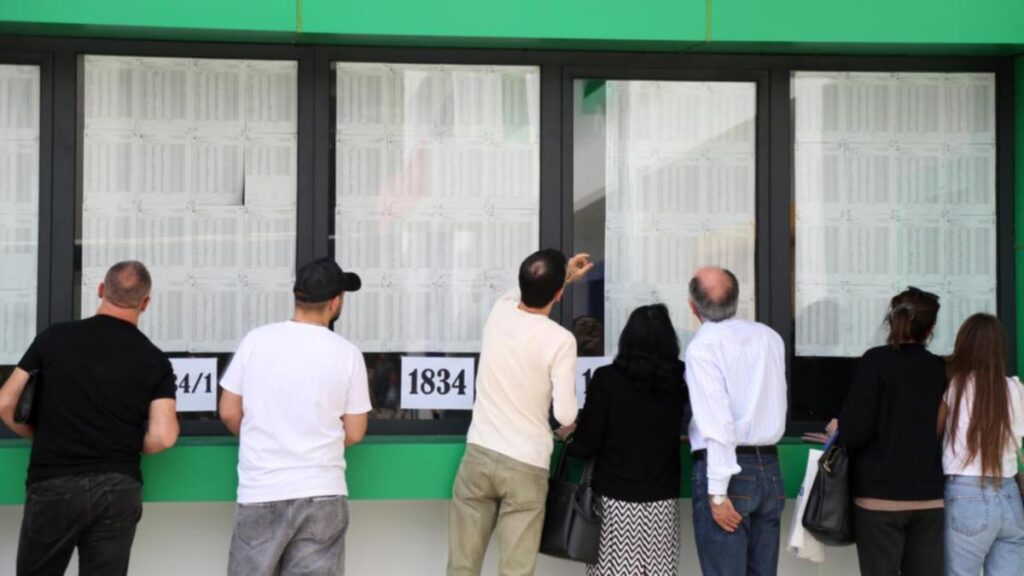Voting has ended in Albania’s parliamentary election after a boisterous campaign dominated by the country’s uphill effort to join the European Union and Prime Minister Edi Rama’s bid for a fourth term.
Polls closed on Sunday evening, and vote counting is expected to conclude within 48 hours.
Because of mass emigration, the country of 2.8 million people has about 3.7 million eligible voters.
For the first time, those in the diaspora — about 191,000 so far this time — could vote, casting their ballots by mail.
Voters were electing 140 lawmakers to four-year terms, choosing from 2,046 candidates representing 11 political groupings, including three coalitions.
The preliminary turnout at 6pm local time was 41.41 per cent, four per cent lower than in 2021.
Rama’s Socialist Party says it can deliver EU membership in five years, sticking to an ambitious pledge while battling conservative opponents with public recriminations and competing promises of pay hikes.
Opening up the election to voters abroad for the first time has added to the volatility, along with the appearance of new parties, a shift in campaigning to social media and a recent TikTok ban.
Voting was largely peaceful, with just a few skirmishes involving candidates and some of their supporters around the country.
“For the most part, excluding some sporadic cases, the process has been in line with the rules and standards,” said Ilirjan Celibashi, the head of the Central Election Commission.
Rama, 60, who secured the start of EU membership negotiations last October, highlighted achievements in infrastructure and justice reform in his campaign.
“Today is the people’s words. Let’s wait for the people to speak,” said Rama after voting.
EU foreign policy chief Kaja Kallas is pressing Albania to continue reforms — particularly in governance and anti-corruption efforts — to stay on track for EU membership.
Rama’s main challenger is Sali Berisha, 80, a former president and prime minister, who argues that Albania still isn’t ready for EU membership.
He started the campaign borrowing from US President Donald Trump’s slogan, which he changed to “Make Albania Great Again,” but eventually settled on “Grandiose Albania.”
Economic concerns have been central to the campaign.
The Socialists say they will accelerate a tourism boom, from 10 million arrivals in 2024 to 30 million by 2030, diversifying destinations by expanding infrastructure projects.
The Democrats argue that the government’s dismal performance has driven more than one million Albanians to leave the country over the past decade.
After casting his ballot, Berisha called on Albanians to vote “for themselves, for their children, their pensions and salaries, employment, business, their farm”.
Both parties made similar promises on minimum pensions, an average monthly salary and a minimum wage – all about 20 per cent or higher than current levels.
But analyst Lutfi Dervishi considered that scenario unlikely.
“It’s a campaign without debate and results without surprises,” he said.
“Elections won’t shake up the current scene — neither the system nor the main actors.”
Despite Albania’s significant improvement in Transparency International’s corruption index — rising from 116th in 2013 to 80th in the ranking in 2024 — corruption remains the country’s Achilles’ heel and a stumbling block for European integration.
Sweeping judicial reforms launched in 2016 with support from the EU and US led to investigations and prosecutions of senior officials.
Several former ministers, mayors and high-ranking officials have been jailed, while others face ongoing investigations.
Despite promises of cleaner governance, both major parties are fielding candidates facing corruption allegations.
Berisha himself has been charged with corruption and is awaiting trial.
https://thewest.com.au/politics/voting-ends-in-albanias-election-amid-bid-to-join-eu-c-18660079


